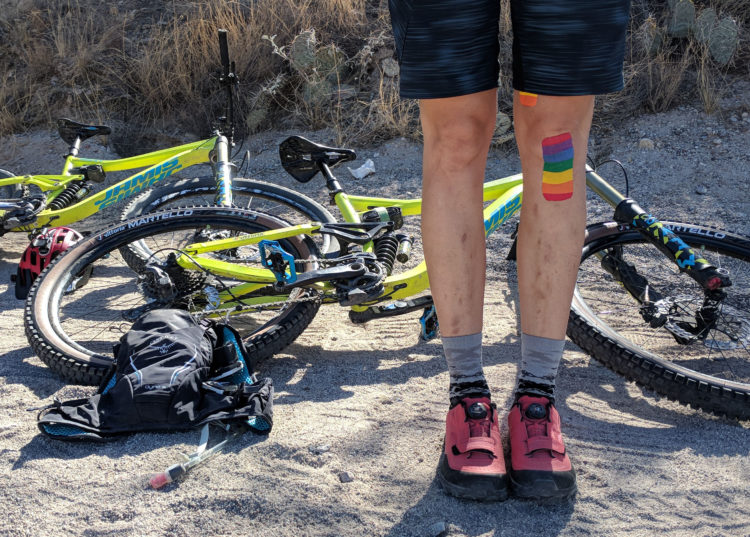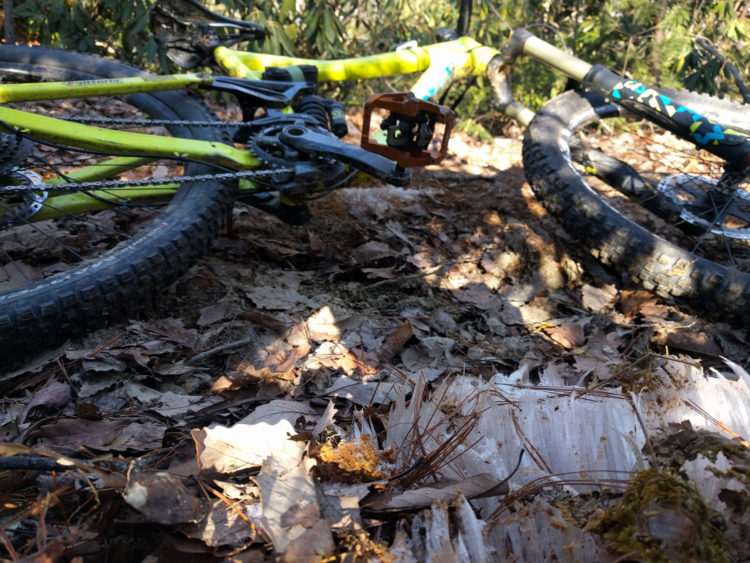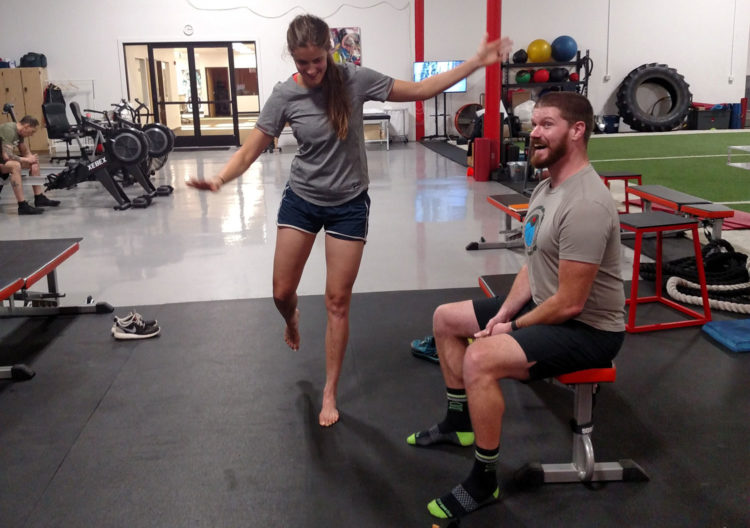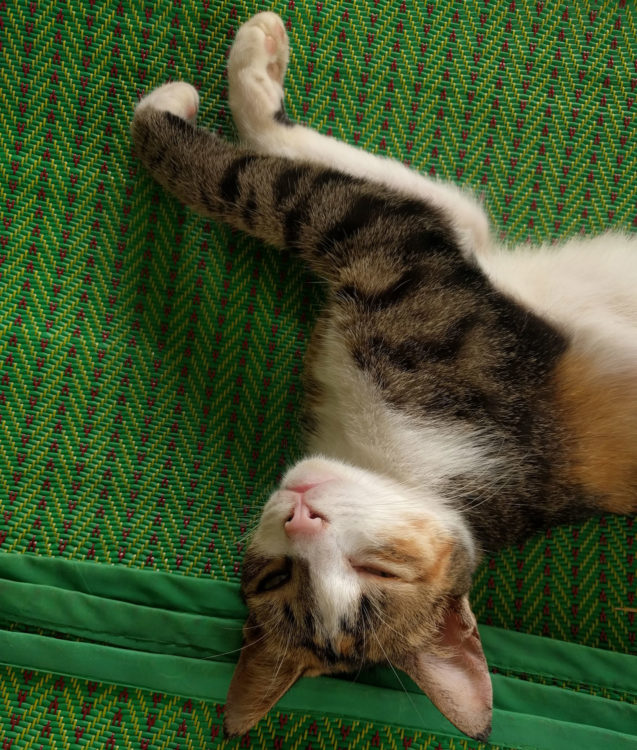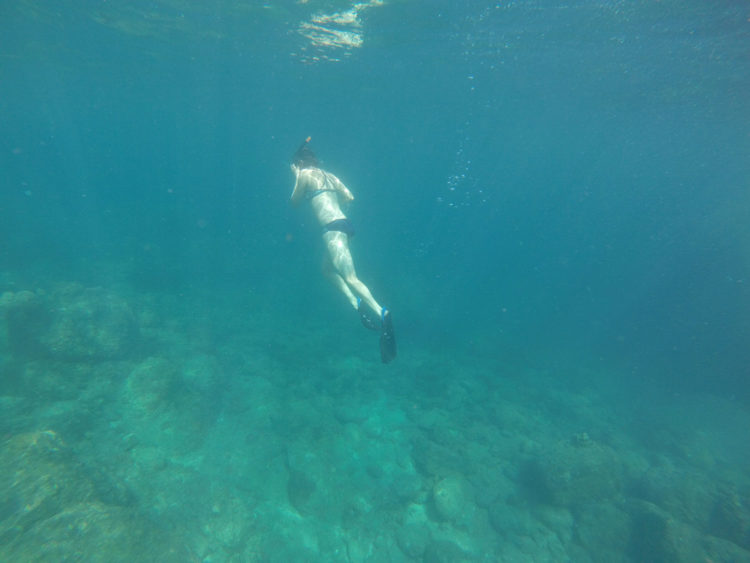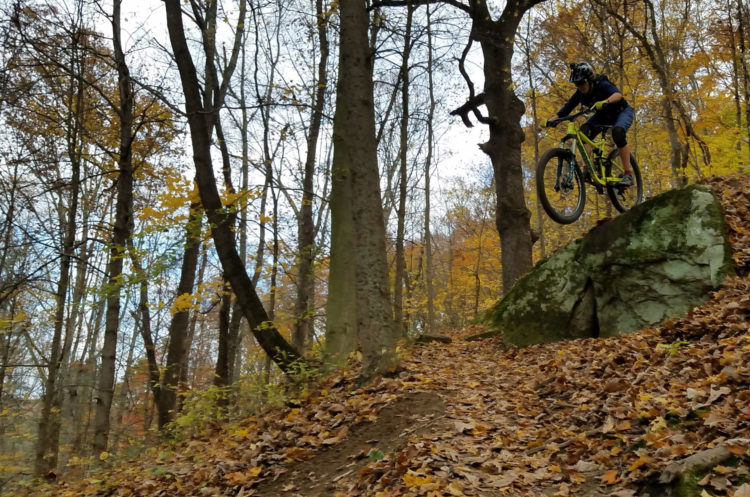Real talk — when I first started mountain biking, it used to make me miserable, like, more often than not. This is because mountain biking is hard, and also because I wasn’t very confident in my own abilities, so perceived failures (OMG SOMEONE SAW ME FALL OVER) would take over my mind and ruin my ride. I wasn’t very good at intercepting these feelings, so usually when something set me off, I would spiral into a pit of doom that could take days to relieve.
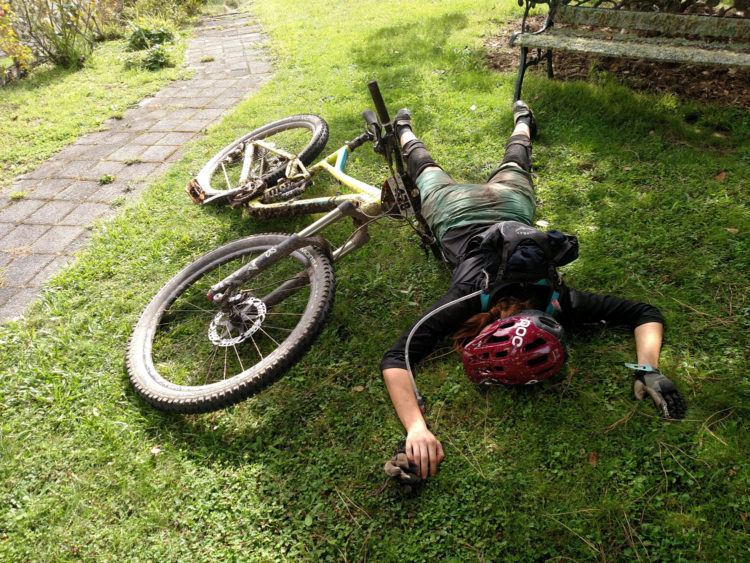
Fully embracing the pit of doom.
While I am no means immune to getting grumpy on a bike ride, I can now usually (no one is perfect) turn it around, reset and enjoy the rest of my ride. And I almost never carry the negative feelings with me for days afterward. So, what changed? Well, many things, but one big change was that I started to work on mindfulness. Yes, I know it’s a buzzword and you hate me now, but it’s a buzzword for a reason. I’ve realized recently that, without consciously intending to, I now use some basic mindfulness techniques to turn around even the worst of bike rides. And you know what? It works.
Here are the two major ways I use mindfulness to turn around a bad ride:
I focus on the present moment.
When I’m having a terrible ride, it usually has nothing to do with the present, and everything to do with things that happened in the (albeit recent) past, and/or things I’m worried about happening in the (near) future. I crashed and now I’m upset about it. I’m worried that I’m going to be the last person up the hill. I’m afraid the climb will hurt my knee. I’m afraid I’m annoying the people I’m riding with by going so slow. I’m not sure I can make it the rest of the way. I’m afraid I went too hard on the first climb. Blah blah blah.
But what if I actually focused on the moment in these situations? What is actually happening to me in the present that is so terrible?
Well, nothing. Usually I’m riding my bike on a beautiful trail in a beautiful place. Sometimes I’m pushing my bike up a vertical rock face, or riding on a road for miles on end, both of which are less fun, but still, in the whole scheme of things they don’t really suck. I’m still on a bike (or at least next to one). Sometimes it’s raining, sometimes it’s cold, sometimes I’m tired, but you know what? Usually the present moment is just not so bad once you let go of past and future worries and expectations and just be.
Of course, this is terribly, terribly difficult. I don’t want to discount that. People spend years studying meditation in the hopes of accessing a few minutes of “just being.” My sister-in-law Kei (hi, Kei) has done multiple 10-day silent Vapassana meditation retreats, and she told me that by the end of 10 days she can sometimes empty her mind for 30 – 40 seconds. That’s 30 – 40 seconds out of TEN DAYS of literally doing nothing but meditating.
So yeah, when you’re having a terrible day on the bike, you’re probably not going to be able to immediately access a state of meditative nirvana. But the key point is that you can try, and while you may not empty your mind, you may find yourself no longer miserable. Focus on your breath. Focus on the trail that is immediately in front of you (not the scary features or massive climbs that are coming later). If you’re climbing, embrace and accept the suffering. Stop trying to distract yourself, and come back to your breath and your pedal stroke. We are always capable of one more rotation of the pedals — always.
And sometimes extreme suffering can be a bit of fast track to a meditative state. I’ve found myself able to access a state of empty mind (in a way that I never have been able to while actually meditating, mind you) on a few occasions while riding my bike. These are extreme occasions, and I think I’ve only gotten there out of extreme desperation. Which is to say, I had to access this state or there is no way I would have finished the race, gotten myself off the mountain before dark, or [insert dramatic scenario here]. These are the moments that I look back on and think “how the eff did I do that? how did I keep going?” The only answer is that I turned my brain off and I pedaled.
Of course, you can’t conjure up near-death circumstances every time you’re grumpy on a bike ride, but you can start by focusing on the present.
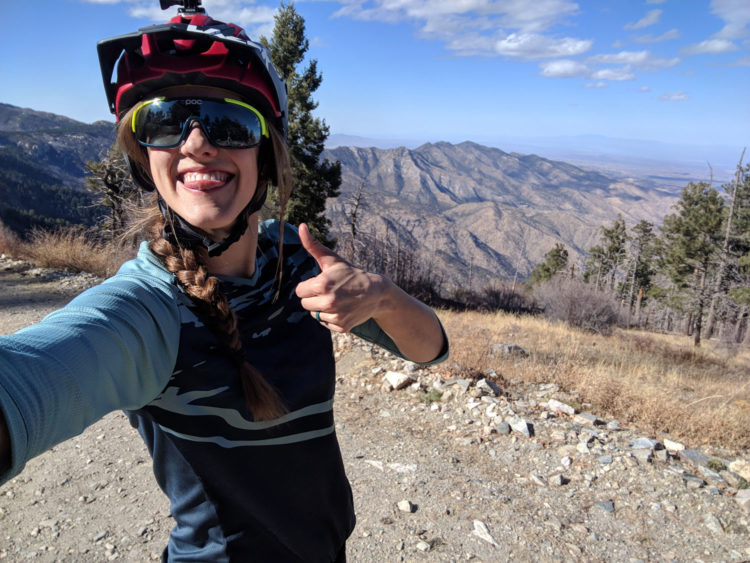
Smile, it’s not so bad!
I trust the moment.
I was reading a book of Zen wisdom recently (yes, yes, I know), and one line stuck out to me in particular: “the moment knows.” What does this mean exactly? I’m no Buddha, but I think the idea is that you should try to trust what you feel in the moment, regardless of your previous plans for this particular moment. Like, say you’re planning to broach a potentially litigious topic with your significant other at a certain time, but then when that time comes around your S/O hasn’t eaten in a while and is in a terrible mood — if you’re trusting the moment, you’ll wait. If you’re focused on your previous plans, you’ll just plow ahead and it most likely won’t go end well.
So how does this relate to being in a bad mood on the bike? Well, it’s just another way to release yourself from the burden of worrying about what is about to happen. For example, sometimes I worry that a long climb will hurt my knee. I start worrying about this at the beginning and I’m often SURE that I will not make it to the top without knee pain. But, sometimes, despite all my worrying, my knee is fine. So I’ve just wasted a lot of time worrying about something that never came to pass. If I trusted that “the moment knows” I could release myself from this cycle of useless worry. If my knee hurt, I would know, and I would do something about it. Otherwise, I don’t really need to think about it.
Another example is when I’m worrying about something that is coming later down the trail. Maybe it’s a drop that I’ve done a few times but it still sketches me out. Maybe someone warned me about some “gnarly rock thing” and now I’m waiting for it to jump out at me around the next corner. Sometimes I’ll compose action plans in my head.
“I’m going to do the thing.”
“I’m not going to do the thing. I’m just not feeling it.”
“No, I HAVE TO DO THE THING. I AM WORTHLESS IF I DO NOT DO THE THING.”
“Nope, not today, definitely not today.”
And so on.
This is a massive waste of mental energy, and it never makes me feel good about myself. Nor does it change the outcome. Usually, when I get to the “thing” in question, the moment knows. I either do it, or I don’t — all previous speculation is just background noise.
The same applies to worrying that you’ve gone out too hard, or that you won’t be able to finish the race/ride/whatever. The moment will know. If you really can’t finish (unlikely), you will deal with that in the moment. You will seek the help you need, or you will just keep pedaling. Trust the moment.
___________________________________________________
These two techniques have saved me on multiple occasions, and I hope they can help you, too. Try them out, and let me know!


